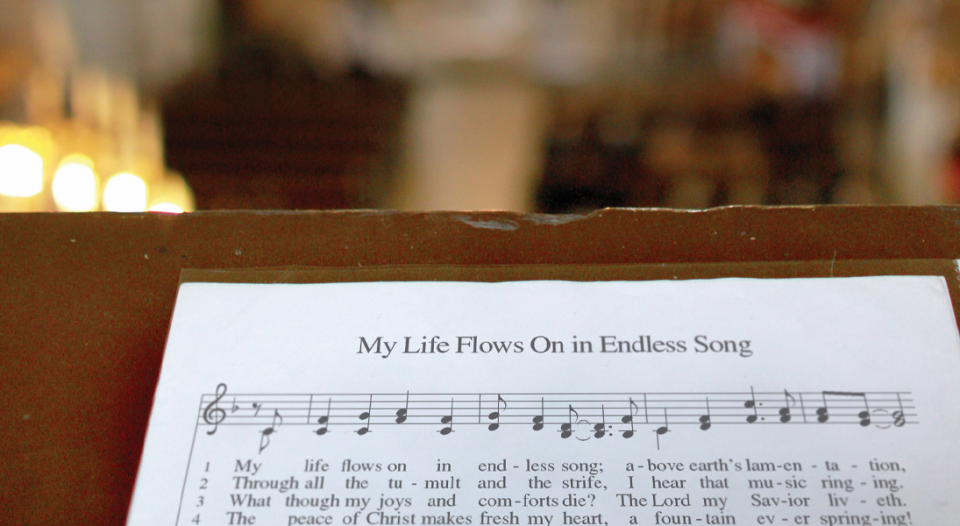I stand in the choir loft with a microphone in hand, flipping through pages of music, preparing to lead worship. Sun shines through the skylight of our sanctuary, a welcoming brightness on this Sunday morning, pre-pandemic. Worship begins and we come to our first song, “Hear Our Praises.”
Energetic piano introduces the song, and by the time we hit the chorus, I’m fully immersed in the joy of singing, tapping my foot and closing my eyes, connected to the other musicians as we make music together.
The chorus comes, where I get to break off into an alto harmony as we sing, “From the heavens to the nations, hear our singing fill the air.” I can almost see the sound travel into the pews of Abiding Hope Lutheran Church, Littleton, Colo., and maybe out the sanctuary doors to greet the morning light.
I have a two-page list of symptoms that keeps growing as my medical team continues to search for answers.
As we finish the song, I feel energized, rejuvenated even, as if the music itself is replacing precious minerals lost to my body throughout the week. I can still feel the pulse of it, matching the rhythm of my beating heart.
Yet, as worship progresses, an unwelcome sensation arrives. The pain in my head increases the more I sustain notes and breathe heavily. It’s a constantly building pressure, as if my head were underwater or a balloon were being blown up against my skull.
My arms and legs tingle and buzz. There’s an aching pain in the entirety of my limbs, as if they are in a constant state of waking up after falling asleep. Today electric shocks travel up and down my nerve pathways, and l feel a crawling sensation across my skin as my muscles twist and contract.
Since high school, I’ve been singing in this choir, at the church where I was baptized. I’ve been a member for over 15 years now.
For the past seven years, though, I’ve had a headache that never goes away. The pain sits behind my right eye and presents itself every minute of every day, to varying degrees of intensity. My diagnosis: a somewhat rare disorder, called new daily persistent headache (NDPH), which isn’t easily relieved or cured.
I was also diagnosed with immune-mediated neuropathy, which affects my arms and legs, my breathing and blood pressure, you name it. This is likely connected to an underlying autoimmune disease. I have a two-page list of symptoms that keeps growing as my medical team continues to search for answers.
Unfortunately, singing worsens my headaches and exacerbates the laundry list of symptoms I grapple with daily. While I’ve considered quitting more than once, I just can’t. Singing is an essential part of my identity, and I’m learning that I can still feel joy alongside pain.
Why put myself through all this added suffering when I’m already dealing with so much pain on a daily basis? When I sing and lead worship, I feel exhilarated. I feel blessed and humbled to be part of leading others through their worship experiences.
Every time I sing, I feel this juxtaposition of delight and sorrow, suffering and solace.
Every time I sing, I feel this juxtaposition of delight and sorrow, suffering and solace. I hope that my love for this isn’t unhealthy, like other situations where people fall in love with something or someone who continually hurts them. What I gain from music and being part of this community outweighs how singing makes me feel physically, so I sacrifice my comfort.
Amid the throbbing in my nerves from my chronic illnesses, I also feel a pulsation deeper down, at the center of my being, reminding me that I am God’s love manifest, just as we all are. Singing with others is the surest reminder I have that we are all connected. This connection to God and others through music is a primary reason I’ve oriented my whole life toward light and love—the way of life that Christ lived and that he died to teach us all.
This joy in spite of my health conditions also reminds me of God’s presence. Often, God does the best work in the hardest parts of living. German theologian and mystic Meister Eckhart wrote, “Thus we raise ourselves up to a great trust in God and gain a great sense of certainty. This brings a spiritual joy that lifts the soul out of her suffering and distress and binds her to God.”
In this way, I trust that the great love and life-creating energy of God will always win out against sorrow and pain. It is the force that raises us out of suffering and into a life of joyful promise.
So here I am, still singing.





